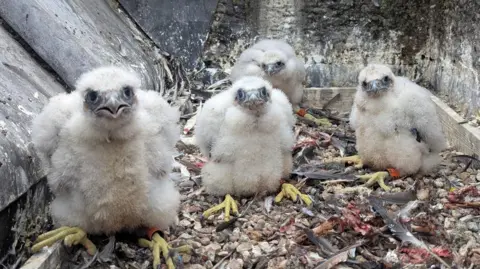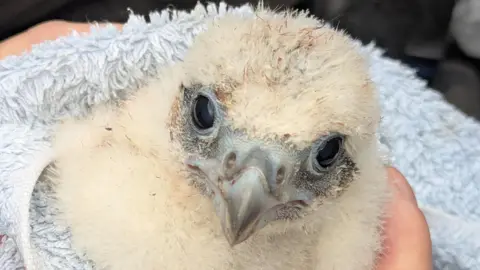Abbey celebrates first peregrine falcon chicks
 Romsey Abbey
Romsey AbbeyPeregrine falcon eggs have hatched at an abbey for the first time, experts have said.
Four chicks, three male and one female, appeared in a gulley at Romsey Abbey in Hampshire about 20 days ago.
The site's first known peregrine nest was in 2024, when the same parents produced two eggs that did not hatch, Hampshire Ornithological Society said.
The number of recorded nests in Hampshire has declined this year, from a recent average of about 20 to no more than 14, the group added.
The chicks could start to fly in four to six weeks' time, the abbey said.
Mr Betton said the parents had choseen to lay this year's eggs in an old nest box in the gulley, ignoring a new tray on the roof where a webcam had been installed.
Last year, one of the eggs was washed away by rain, but the ornithologist said this year's chicks would probably not be harmed by any downpours.
 Romsey Abbey
Romsey AbbeyPeregrine falcon numbers had fallen to about 350 pairs in the 1960s, following wartime extermination efforts and pesticide use, Mr Betton said.
The growing UK population, which now amounted to more than 2,000 pairs, had led to competition for nesting sites, he said.
"Young female peregrines, born in the last two years, are turning up at nests, attacking the existing female," he explained.
"If they kill her, they take over the nest and the male."
Mr Betton said disease could be one reason for the decline in the number of local nests.
"Bird flu, which has been around for about five years, has affected sea birds in particular," he said.
"If a peregrine were to eat an infected gull, it would likely catch the disease."
Two peregrines - one with confirmed bird flu - recently died after nesting at Christchurch Priory in Dorset.
You can follow BBC Hampshire & Isle of Wight on Facebook, X (Twitter), or Instagram.
